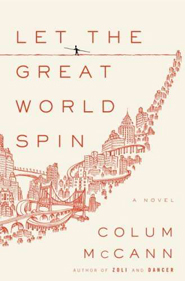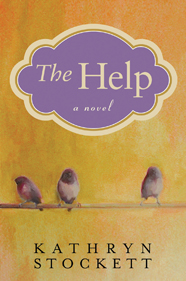-
March 22, 2010
Quarterfinals
-
Commentary by
Kevin Guilfoile & John Warner
-
Today’s Winner:
1Let the Great World Spin
John: A much closer contest than some may have anticipated, but Let the Great World Spin marches on. Alex Balk gets at the core conundrum of our (and really any) contest, by what criteria are we deciding what’s “best?”
As Judge Balk points out, if I were judging on the same criteria, (my notion of what makes something “literary”) it wouldn’t be close, Let the Great World Spin would steamroll The Help flatter than tax rates if Ron Paul were president.
On the other hand, if it’s raw reading pleasure, which book I “enjoyed” more as I was engaged with it, for me, personally, it’d be a relatively close contest. I read The Help more quickly, eager to find out what was going to happen since Stockett stuffs plenty of plot between the covers, almost to the point of potboiler. On the other hand, Let the Great World Spin hits the reset button every time the story line and perspective changes and I’d find myself needing to settle back into things. (Structurally, Let the Great World Spin is really a series of linked novellas.) In the end, though, it’s Let the Great World Spin that’s sticking with me, so it manages to also pull off the victory on the entirely subjective, “which book I liked more” criteria.
Kevin: Judge Balk brings up the issue of dialect in The Help, and it’s something I struggled with in that book as well. And like him, it was difficult to put my finger on why. I couldn’t say the dialect was inaccurate. And after I read Let the Great World Spin, which also has a chapter from the point of view of a black female character, also told in dialect, a prostitute and drug addict no less who throws f-bombs and n-bombs all up and down Lexington Avenue (as compared to Stockett’s saintly characters of Aibileen and Minny), I wondered if my objection was even unconsciously sexist.
With some time to reflect, though, I think the issue that makes people uncomfortable is this: The Help is fundamentally a book about white people. It is about white people living in ignorance and without empathy for human beings who raise their children and cook their food, individuals they exploit and humiliate, people they treat as less than human even as they depend on them for the most fundamental things. It is a book about white experience, written by a white person, but mostly in black dialect. As I said in the last round, I also think it’s a good book. But I think it is this dichotomy—that it’s a novel in black dialect that is only superficially about the black experience—that makes me and others sometimes uncomfortable. I think.
John: I think it’s interesting to note how absolutely beloved The Help is by its readers. They seem to hold none of the qualms that we’re batting around here. Sure, maybe it’s “book club” fiction, but it’s not like book clubs love every last selection, or that creating a great book club read is easy to do. This specific book hooked into readers in a way that very few others ever do or will. It’s up in The Lovely Bones, The Kite Runner territory. It’s probably sold 20 times more copies than Let the Great World Spin, which is a bestseller in its own right. What I think it demonstrates is how sui generis every commercially successful book is, that for all of publishing’s efforts to find the next big thing that’s similar to the last big thing, their time is better spent finding the next big thing that’s like itself.
I think this is illustrated in the, thus far, comparatively lackluster sales of a book called The Postmistress, which was positioned quite literally as the next The Help. It’s a historical novel with some romance published by the same specialty imprint (Amy Einhorn Books). Its Amazon page features a conversation between Kathryn Stockett and the author of The Postmistress, Sarah Blake. It may as well have “If you liked The Help…” printed across the cover. Sure, The Postmistress is the no. 10 New York Times hardcover bestseller, but it looks like that’s its peak (at least for now), and its Amazon ranking is, at this writing, 196. Don’t get me wrong, I’d kill for a book ranked 196, but The Help is currently no. 2 on Amazon, more than a year after its release. The Postmistress just isn’t the next The Help. Now, The Postmistress was written and signed by the publisher long before The Help was released, so it’s not like they went looking for the next The Help, and then found the manuscript closest to it. All of these comparisons are a marketing decision, but as an actual former marketing research professional, I have to wonder about the strategy. While I see its short-term efficacy in that it creates an instant hook and marketing message, my feeling is that it causes more problems than it solves.
When you tell a reader that if they loved The Help, they’ll love this book, what happens when (almost inevitably) they don’t? The Help is your target reader’s favorite book of the last five years, maybe ever, and you’re signaling to them that this new book is just as good. But it isn’t. By definition, it almost can’t be since you’re telling them they’re going to get the same experience as they did with The Help, which is impossible. When the book begins to part from that experience, the response it sets up in the audience’s head is “why is this different from this book I loved so much?” The book is now falling short, bit by bit, of a standard that was impossible to meet in the first place, and that word of mouth that launches The Help to massive success begins to turn sour. While that yoking of The Postmistress to The Help is likely what got it to the bestseller list in the first place, I think it’s also ultimately a strong limiting factor to the sales success of the book. It effectively kneecaps the word of mouth.
I am just a humble caveman, so maybe this is good marketing, safe marketing, but that same marketing squad also helped break The Help into the stratosphere without yoking it to another book. The Postmistress has plenty of marketing dollars behind it (at least in book terms) and those dollars are going to make at least some hay regardless of how they’re spent. I guess this mostly points out how tough it is and always has been to market books since the relationship between consumer and product is so personal, it’s almost impossible to create some sort of mass message that’s going to get traction.
Kevin: I have worried about the same thing with regard to my own books. Certainly you want to focus your efforts on the people most likely to enjoy your book, but there are pitfalls in tying a book too tightly to another. The most important thing a book can have is good word of mouth, but, in your example, I’m certain there were people who, although they liked The Postmistress just fine, described it to friends by saying, “It’s not as good as The Help, but…” That negative qualification as a first impression, even if it’s followed by superlatives, is a difficult thing sometimes for a book to overcome. I’m not sure what the answer is, though.
On to housekeeping. Let the Great World Spin was the top pick in both of our confidence rankings (that is, it was not necessarily our personal favorite but the book we thought had the best chance to win the tourney). As it advances, I maintain a razor-thin lead in our side wager, 102-97.
As you can imagine, The Help received quite a few votes in the Zombie poll, but it fell just short of our top four. It will not be coming back. So the novels in contention for the Zombie Round remain (in alphabetical order):
- Everything Ravaged, Everything Burned
- Fever Chart
- A Gate at the Stairs
- Miles From Nowhere
Tomorrow we have The Lacuna versus Burnt Shadows. It’s the first match of the tourney in which I have read neither book. Prepare for a digression about last week’s episode of Caprica.
John: While I’ll be offering my take on the outstanding new FX series Justified, which is based on an Elmore Leonard short story, so at least that’s literature-related.
Kevin Guilfoile is a contributing writer for TMN. His debut novel, Cast of Shadows, has been translated into more than 17 languages, and his second novel, The Thousand, will be published in August 2010 by Alfred A. Knopf.
John Warner is a contributing writer for TMN. He is the author of Fondling Your Muse: Infallible Advice From a Published Author to the Writerly Aspirant. He teaches at Clemson University.

















